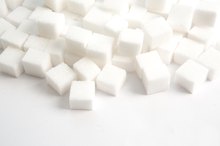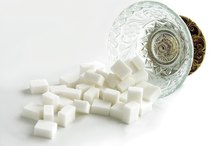White Sugar vs. Organic Evaporated Cane Juice
If you're trying to live a healthier lifestyle, you may be thinking about replacing your white sugar with something a little healthier. Organic evaporated cane juice undergoes less processing than white sugar and sounds like a better option. Nutritionally, the two sweeteners aren't that different. But as an organic food, the organic evaporated cane juice may make a slightly better choice when used in moderation.
About the Two Sugars
White sugar, also known as regular or table sugar, is made from either sugar beets or sugar cane. Whether the white sugar in your bowl comes from beets or sugar cane, both undergo a filtering process to decolorize the sugar. As the name implies, organic evaporated cane juice comes from sugar cane. The juice from the sugar cane is filtered, evaporated into a syrup, then crystallized and cured. The evaporated cane juice is tan in color and has a slight molasses flavor.
Comparing the Nutrition
Cane vs. Beet Sugar Nutrition
Learn More
The nutritional make-up of the two sweeteners is very similar. One teaspoon of white sugar contains 16 calories and 4 grams of carbohydrates. The same serving of organic evaporated cane juice contains 15 calories and 4 grams of carbohydrates. Neither of the sweeteners is a good source of vitamins, minerals or fiber.
Sugar is Sugar
Both white sugar and organic evaporated cane juice are considered added sugars because their purpose is to sweeten foods to improve taste. Whether the sugar you use comes from a box or from fruit, your body uses it the same way, according to the 2010 Dietary Guidelines for Americans. However, unlike the sugar naturally found in a piece of vitamin- and mineral-rich fruit, the white sugar and organic evaporated cane juice offer no nutritional value, only calories. Limiting your overall intake of added sugars, whether from white sugar or evaporated cane juice, can help reduce calorie intake without compromising the nutritional quality of your diet.
Why Organic is Better
Calories in 1/4 Cup Sugar
Learn More
If you need to add a little sweetener to your morning coffee, organic evaporated cane juice might be the better choice. As an organic food, the evaporated cane juice contains fewer pesticides and drug-resistant bacteria. Additionally, when you buy organic food, you are helping promote the reduction of pollution, water waste and soil erosion. Organic foods are also safer for the farmworker and any small animals that live close to the farm where the sugar cane is grown.
Related Articles
References
- The Sugar Association: Types of Sugar
- American Academy of Pediatrics: Is It Important to Feed Kids Organic Food?
- U.S. Department of Agriculture & U.S. Department of Health and Human Services: Dietary Guidelines for Americans, 2010
- Vegetarian Resource Group: Sugar and Other Sweeteners
- Helpguide.org: Organic Foods
Writer Bio
Jill Corleone is a registered dietitian and health coach who has been writing and lecturing on diet and health for more than 15 years. Her work has been featured on the Huffington Post, Diabetes Self-Management and in the book "Noninvasive Mechanical Ventilation," edited by John R. Bach, M.D. Corleone holds a Bachelor of Science in nutrition.









